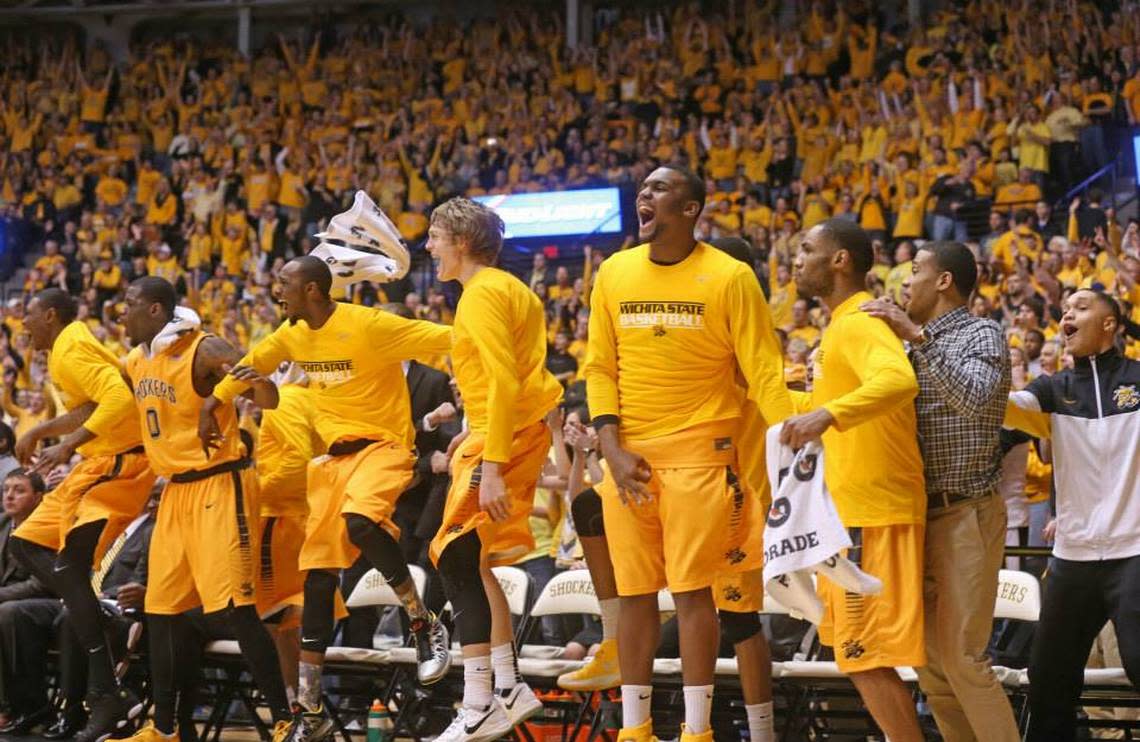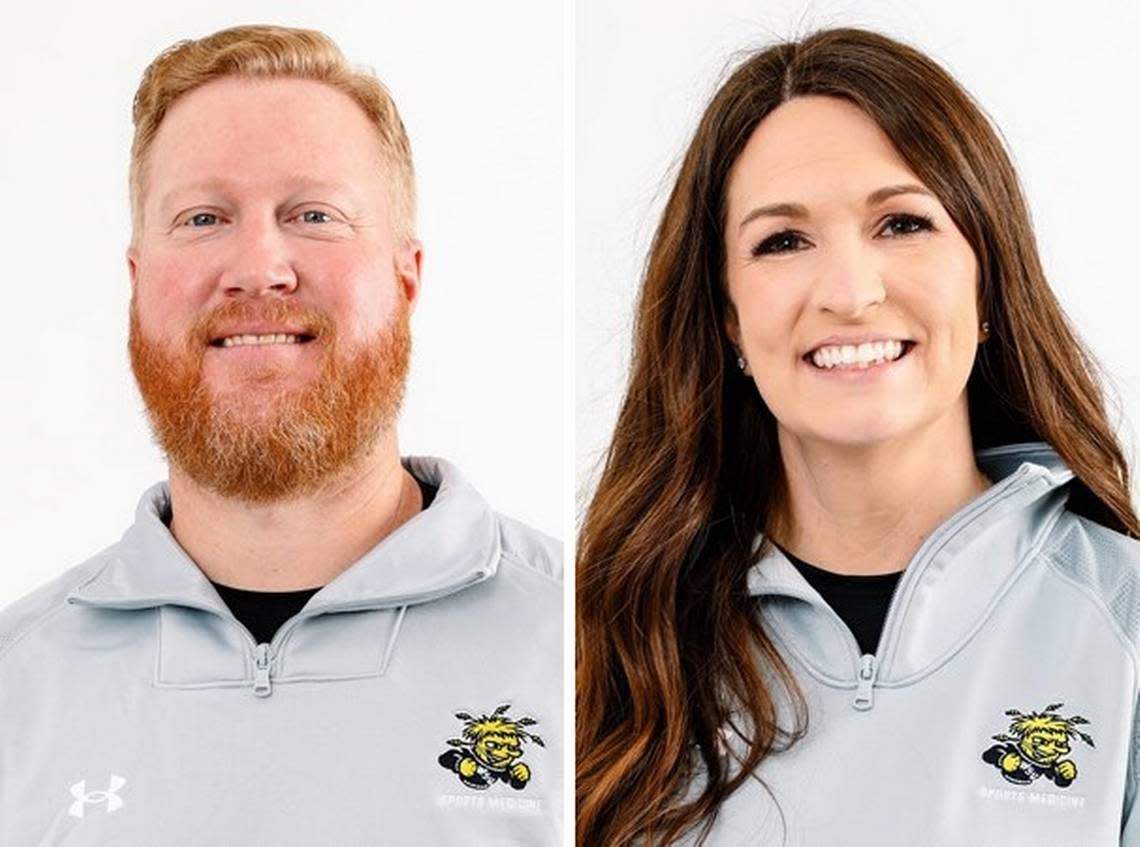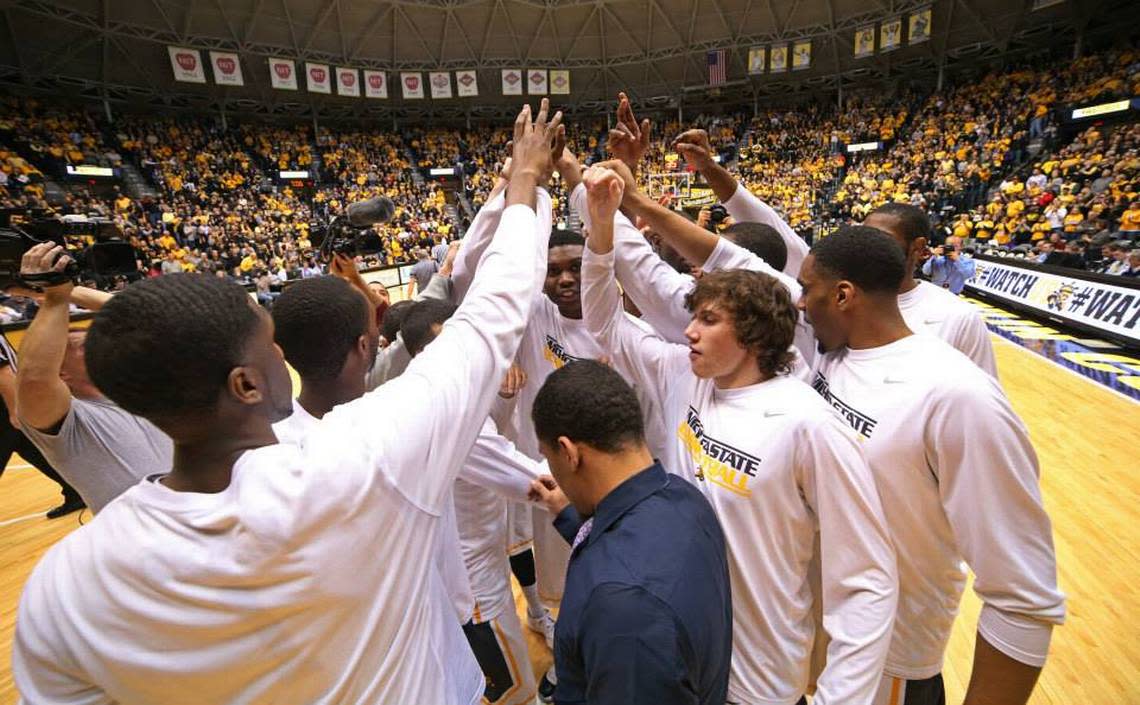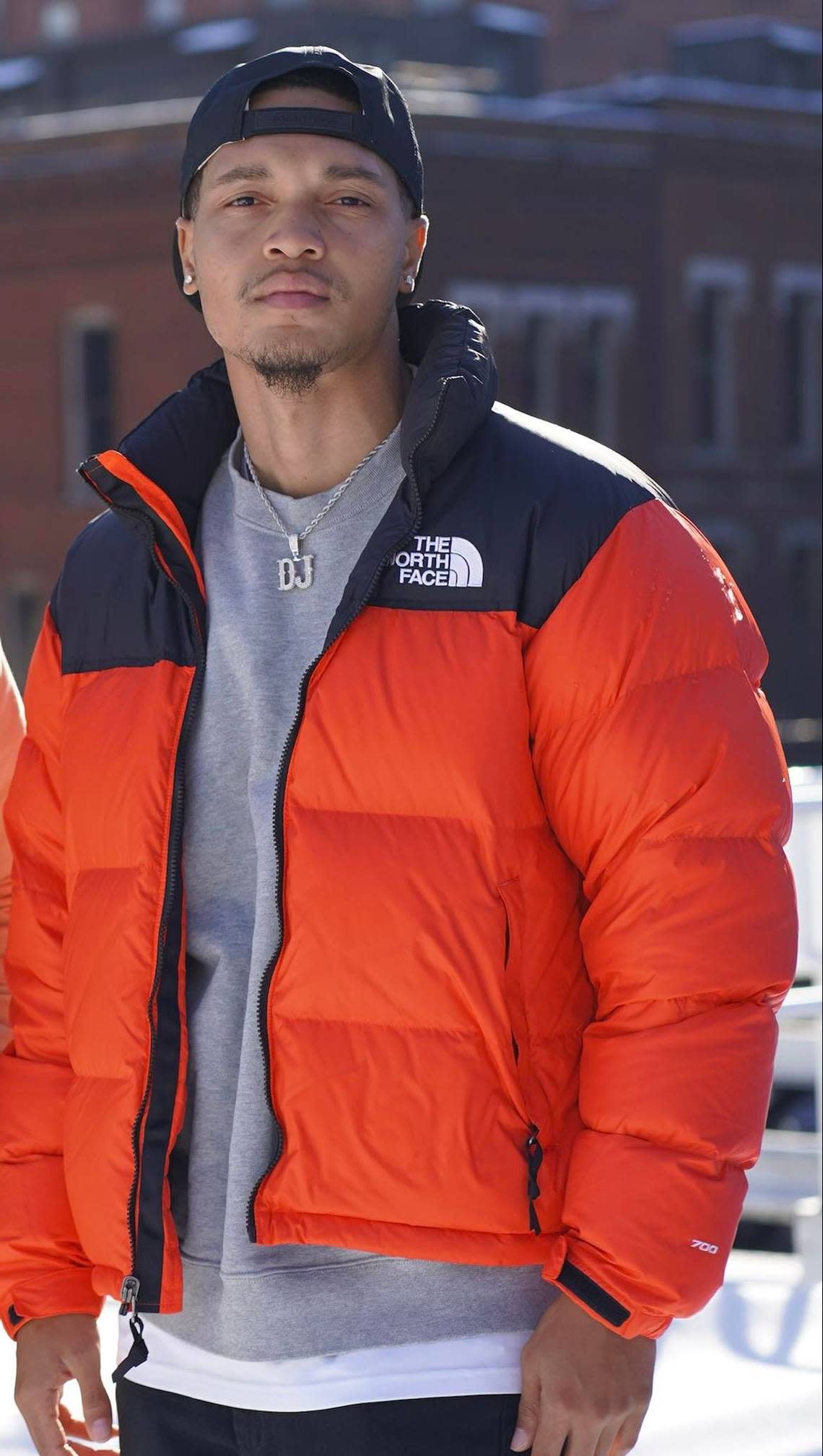‘Count your blessings’: Former Shocker DJ Bowles grateful for second chance at life
Lying on his back motionless at center court at Koch Arena, D.J. Bowles was presumed dead.
The incoming freshman point guard on the Wichita State men’s basketball team, who had no pre-existing conditions, collapsed when his heart failed during a preseason workout on Sept. 3, 2013. He was saved by two quick-thinking athletic trainers on site who revived him through CPR and an external defibrillator.
To this day, Bowles has never received a medical explanation for why an otherwise healthy, 18-year-old basketball player’s heart suddenly gave out. The reason why his college basketball career ended before it even began remains a medical mystery.
For the first time, just shy of the nine-year anniversary, Bowles and the athletic trainers who saved his life, Todd Fagan and Kat Hollowell, discussed what happened that fateful day at Koch Arena.
In an exclusive interview with The Eagle, Bowles, now 27 living in Nashville, Tennessee and working for a company started by a childhood friend, says he has found happiness focusing on the present and future rather than dwelling in the past.
“It gives you a new outlook on life to appreciate every day and count your blessings,” Bowles said. “I’m just really grateful for the people who were at Wichita State at the time because if it wasn’t for them, I wouldn’t be talking to you right now.”

“It could have been all over just like that”
Individual workouts, or “indys” as they’re known by players, are an opportunity for players to make an impression on a coaching staff.
D.J. Bowles was ready to do just that when Wichita State scheduled its point guards — Fred VanVleet, Bowles, Ria’n Holland and J.R. Simon — for a brief-yet-intense workout at Koch Arena on Sept. 3, 2013 led by assistant coach Greg Heiar.
One of the first drills of the day had a pair of players start at halfcourt with a ball handler and a defender. The ball handler was challenged to make an explosive move to gain an advantage, then finish either a jump shot or a crafty shot around the rim.
Bowles distinctly remembers feeling “weird” from the start. After a few reps, he became winded and hunched over with the ball to his side. When he tried to step forward for his turn, Bowles lost consciousness and dropped straight back with his head crashing to the hardwood at center court.
“I can still vividly remember the sound of the thud he made when he hit the ground,” said Simon, who was paired with VanVleet. “I didn’t see it, but I knew something was wrong when Fred’s eyes got huge.”
Jeff Chapman, a student manager helping with the workout who is now the team’s video coordinator, darted up the stairs of Koch Arena to the Sports Medicine Complex, located in the northeast corner of the concourse level, to alert Todd Fagan, the team’s athletic trainer.
When Fagan rushed out the door, he made the critical decision to bring an AED (automated external defibrillator) to the court — a decision he normally wouldn’t make without an initial evaluation.
“I could tell just by the look on (Chapman’s) face that this was something serious,” Fagan said. “This wasn’t just a player injured.”
Down on the court, the teenage student-athletes watched in horror as Bowles convulsed. WSU head coach Gregg Marshall had traumatic flashbacks to six years prior when he was sitting in the stands and saw 19-year-old WSU recruit Guy Alang-Ntang collapse and die during a high school basketball game.
“We were all panicked,” Marshall told The Eagle in 2013. “It was a tough thing to witness. I’m talking to D.J., ‘Please breathe, breathe, stay with us.’ Just trying to coach him and coaching doesn’t do much good right then.”
Bowles was unresponsive without a pulse by the time Fagan arrived on the scene. He was joined not long after by fellow athletic trainer Kat Hollowell, who was alerted to the emergency by the alarm set off when the AED unit was opened.

It didn’t take long for it to become clear to the trainers that they were going to have to do something they had never done before, use an AED on an athlete, to save Bowles’ life.
“You train for it and prepare for it, then you hope you never have to use it,” Fagan said. “It was like I went back to my training and all of my practice episodes I’ve gone through and just tried to stay calm.”
“You don’t have time to get nervous,” Hollowell said. “It becomes kind of automatic where you get into that mode.”
Bowles was in a severe arrhythmia, an irregular heartbeat, that would have proven fatal if not corrected quickly. Every second mattered as Fagan hooked Bowles up to the AED, then shocked him once with the device. Hollowell followed with two rounds of rescue breathing.
The uncomfortable silence in the gym was broken by a sudden and loud gasp for air, as Bowles began to breathe as if he had been underwater for two minutes.
“I was dead, man,” Bowles said. “I remember waking up and everybody was around me, looking at me. I was so confused when I woke up and I panicked because I didn’t know what was going on.”
It’s impossible to know the range of normal reactions to the situation, but Bowles’ reaction was certainly not what those in person were expecting.
After gaining his whereabouts, Bowles jumped up and paced in a jittery state, ranting about random things. Bowles doesn’t have a recollection of what he said, but those who were there on the floor remember one specific thing he was demanding: a cherry pie.
“One minute he’s completely unresponsive, then out of the blue he’s up and around and craving cherry pie,” Fagan said. “I just remember telling him, ‘We don’t have any of that for you, bud, but we need you to sit down for us.’”
By that time, the ambulance had arrived at Koch Arena and Bowles was taken away on a stretcher and transported to a local hospital.
Coaches and teammates all visited Bowles in the hospital that first night, but one spent the entire night by Bowles’ side sleeping in a chair: Simon, the true freshman walk-on.
“His parents and family weren’t in town yet, so I just didn’t want him to be alone,” Simon said.
The medical tests could identify what happened to Bowles, but could not pinpoint why it happened. His family had no history of heart problems and Bowles thought he had a perfect bill of health before the incident. At that point, he was grateful to just be alive.
“Todd Fagan saved my life,” Bowles said. “If it wasn’t for Todd and the trainers, I wouldn’t be here right now. I truly believe I was in the right place at the right time and had the right people with the right equipment to know what to do in that situation.”
Fagan agreed with Bowles’ assessment of being in the right place at the right time.
“Had that happened on the walk back to the dorm or if he was shooting around with some guys in the gym with nobody around, then the outcome might not have been as good,” Fagan said. “And that’s why it’s important for (athletic trainers) to be prepared to save a life whenever you go into the office because you never know when a situation like that is going to happen.”
Bowles remains the first and only student-athlete that Fagan, who is still the men’s basketball athletic trainer, and Hollowell, who just celebrated her 15-year anniversary at WSU, have had to use an AED on.
It’s an event that still impacts both athletic trainers to this day.
“Minutes matter in situations like that and if he was playing somewhere else, then something different could have happened and unfortunately that happens far too frequently,” Hollowell said. “That’s why it’s important to have athletic trainers where athletes are because you never know what could happen. We have a pretty thankless job, so to hear D.J. (express gratitude) just reinforces to me that what we’re doing is a good thing.”
“It was a pretty powerful event because it changes your perspective on a lot of things,” Fagan said. “There was a real fine line between someone living and someone dying that was a young individual who had no history and it could have been all over just like that.”

“That’s why I’m a Shocker for life”
It’s easy to forget Bowles should have been the backup point guard to Fred VanVleet on Wichita State’s historic 2013-14 team, which became the first men’s basketball team in NCAA history to achieve a 35-0 record before falling to Kentucky in the second round of the NCAA Tournament.
Bowles, a crafty, 6-foot-2 scoring guard out of Cleveland, Tennessee, was recruited by WSU assistant Heiar to play a role for a team coming off a Final Four run with stars like Cleanthony Early, VanVleet, Ron Baker and Tekele Cotton back.
There was pressure walking in the door.
“I still remember being really nervous my first day because we started playing pickup as soon as I got there,” Bowles said. “I was real young and playing against guys like Fred and Ron and Cle. It was just high-level basketball. That was a really exciting time for me.”
Unfortunately for Bowles, the thrill was short-lived: the September workout when he collapsed was one of the first of the fall semester and more than two months away from the start of the season.
Wichita State ultimately refused to medically clear Bowles to return to the basketball court, but Eric Sexton, the athletic director at the time, extended the offer to honor his scholarship to the university for all four years. It was an offer that Bowles took up, spending three years at WSU before returning home.
“I’ve got a lot of love for Wichita State,” Bowles said. “I really appreciated that and was grateful for them doing that. They did right by me. That’s why I’m a Shocker for life.”
While WSU didn’t clear him, Bowles still had hopes of playing elsewhere when he received medical clearance from a renowned cardiologist at the Mayo Clinic, where he spent time being treated following the accident.
He took a handful of official visits to other schools that fall, but in the end, Bowles decided against the idea.
“I just made up my mind that I didn’t want to play no more if I couldn’t be the player that I was before,” Bowles said. “And with all of that on my conscience, there was no way I was going to be the same player. So I decided to give it up.”
Marshall allowed Bowles to remain connected on the team for the 2013-14 season as a student manager following his recovery and return to campus. The players on the team still treated him like a teammate and included him in team activities, which Bowles still appreciates to this day. He attended practices, rebounded for his former teammates, and had a front-row seat to watch the greatest season in Wichita State history unfold.
But for every rush of adrenaline he felt watching the Shockers break records and win championships, he couldn’t fight off the sorrow of not knowing why he couldn’t be on the floor helping the team along the way.
“I really enjoyed the experience and I was happy for them, but at the same time, I wanted to be out there so bad,” Bowles said. “I had a lot of fun being around those guys and watching them play. But I was a basketball player, so of course I was still in that mode where I wanted to be out there. It was a very bittersweet experience.”
Bowles had a natural ability to score and those who saw him play still wonder how years of tutelage from VanVleet and the coaching staff could have impacted him as a facilitator and defender. How much could he have changed the fates of the 2014-15 and 2015-16 teams? Would he have been the star senior point guard for the 2016-17 team?
What could have been with Bowles on the Shockers is still a question his former teammates ponder to this day.
“That’s one of the saddest things about this whole story is the unknown part of what could have been with his career,” said J.R. Simon, a former WSU teammate. “It would have been very interesting to see how it would have played out because he was a tremendous player, but an even better guy. And when you match those two things up, then success usually follows.”

“Appreciate every second I have on this Earth”
The years immediately following the incident were difficult for Bowles.
Basketball had been his identity in life and when the game he loved so dearly was taken away suddenly from him, Bowles was left in limbo.
“I was a basketball player my whole life and that’s what my focus was, then one day you get told you can’t play basketball anymore and it was a tough transition,” Bowles said.
Without a medical explanation, Bowles struggled to find closure with what happened. He stopped attending WSU three years after the incident and returned home to Tennessee, where he bounced around different jobs in search of his niche.
It took time, but Bowles said he finally feels like he has moved on.
“It was just a matter of time passing and I’m finally getting to a place these last few years where I’m kind of over it,” Bowles said. “It was frustrating there for a few years not knowing why, but I would say now I have closure. I’ve moved on with my life and I can say that I’m feeling good and my life is going in a positive direction.”
Bowles has found a new passion in the last year working with his childhood best friend in Stedmon Ford, reuniting a duo that used to be star basketball players on the same high school team in Chattanooga. Ford recently started his own logistics company named Wilford & Sons that operates out of Nashville.
Helping coordinate the movement of supplies and materials has given Bowles a new challenge that he says has brought out the best in him.
“After college, you’ve got to figure out what you want to do in life and it took me a few years to figure out what that was,” Bowles said. “It took a while, but I’m at the point now where I’m doing what I’m interested in and I’m learning a lot about the business side of things. Life is good right now.”
Bowles no longer dwells on thinking about what could have been with his basketball career, but he does look back fondly at the time he spent in Wichita.
He still tries to catch a few Shocker basketball games on television every season and was glued to ESPN this summer to watch the AfterShocks’ run to the semifinals of The Basketball Tournament.
Thinking back on his time at Wichita State elicits a wide range of emotions for Bowles. It’s a chapter in his life he’ll never forget as he looks to make the most of what he considers a second chance in life.
“When you go through something like that, the things that you used to think were a really big deal don’t really seem that big after that,” Bowles said. “It’s made me appreciate every second I have on this Earth.”
